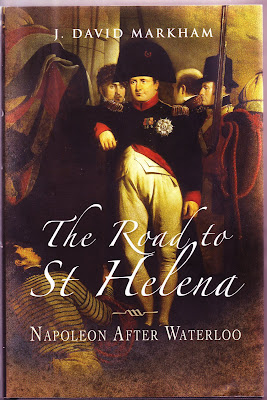
I have said on a previous blog that one of the best things about blogging is the emails that you get.
I have recently had a very interesting query from novelist and historian Mike Hutton about one of the horses that raced on St Helena in Napoleon's time.
Some Background: Horse Racing on St Helena
During the captivity horse racing took place twice a year at Deadwood from April 1817. The organiser was the young Captain (later Admiral) Henry John Rous, pictured above in later years, who was to become the 'dictator' of English horse racing. (1)
Napoleon used to watch the races from behind the shutters at Bertrand's cottage (2). I understand that his horses were lent for the racing, as were those of the Governor.
The horses which took part in the first meeting were
African, Brickdust, Blucher , Bacchus, Botherum, Comet, Creeper, Dolly, Emperor, Feather, Fidget, Grinder, Hambletonian, Hope, John Bull, Kutusoff, Manks, Marske, Mansel, Negro, Pringle, Prime of Life, Regent, Royal Oak, Regulus, Sebastian, Salamanca, Toussaint, Tom Tit, Tom Crop, Tickler, Whiskey.
Basil Jackson's Reminiscences are worth recording
... recalls to my memory our St Helena racing,
over which Captain Rous ruled with all the authority he so long exercised at Newmarket. We had our Turf Club, and an excellent mile-and-a-half course at Dead wood. It is true that our horses were not of high quality, but they afforded quite as much amusement as if they had been thoroughbred Rous infected me with his racing taste, and he found me an apt pupil, though invariably opposed to him. The Gover- nor was very liberal in his patronage, giving two handsome plates annually, and generally attended the sport in person ; he also placed his horses at the command of Captain Rous, and as they, or some of them, were English, and the best in the island, he enjoyed great advantages. The light weights of both army and navy furnished jockeys, and all turned out in proper racing equipment.
(3)
The Mystery of Blucher
To return to the query from Mike Hutton. He is doing some research on early English horse racing and is trying to find out what happened to the famous English race horse Blucher. This horse won the Derby in 1814 and was recorded as being at stud in the UK in 1817, but disappears without trace from the records by 1822. He wondered whether the horse on St Helena which was listed as racing in the first meeting in 1817 was the same horse.
There is fairly incontrovertible evidence of the sale of Blucher along with 3 slaves Under the Tree on St. Helena in 1829. I am inclined to doubt that this was the famous Blucher, although the sellers might have been happy to give that impression. Jackson indicates (see passages in bold above) that the standard of horse racing on St Helena was not very high, and I would have thought that the presence of a Derby winner would have received much notice. If anybody can help Mike to resolve the mystery of what happened to the famous Blucher, or any more information on the 1829 auction then please let me know, and I will pass the information to him.
________________________________________________
1. Henry John Rous (1795 –1877), second son of the 1st Earl of Stradbroke, British admiral, steward of the Jockey Club, author of the standard work on the Laws and Practice of Horse Racing, Conservative MP and First Lord of the Admiralty. Rous came out to St. Helena in the Conqueror, in August 1817 he was appointed to command of the Podargus. In January 1818 he was transferred to the Mosquito, and he left St. Helena in July 1819.
2. See my blog entry of March 4th 2008.
3. Basil Jackson Notes and Reminiscences of a Staff Officer, Chiefly Relating to the Waterloo Campaign and to St. Helena Matters During the Captivity of Napoleon (1877 & 1903). Jackson also describes an event that I have referred to on an earlier blog: : During the first day's sport after our arrival,
an awkward circumstance occurred on the course, which everybody regretted when it could not be helped. A certain half-mad and drunken piqueur of Napoleon, named Archambault, took it into his head to gallop within the ropes when the course was cleared, and the horses coming up. For this transgression he was pursued by one of the stewards, and horse-whipped out of the forbidden limits. This gentleman knew not that the offender belonged to the Longwood establishment, or he would, no doubt, have spared his whip — particularly as Napoleon at the time was sitting on a bench outside his residence, looking at the crowd through a glass, and we were apprehensive that he might in-terpret the accidental chastisement his servant had received, into a premeditated insult to the master.
But we did Napoleon injustice by the sup- position. Mr O'Meara told me the next day, that he had distinctly witnessed everything thai passed, and had been very angry when he saw Archambault galloping alone along the course, and was pleased to see him chastised ; and that he had called him into his presence, and ex- pended on him a few f- beies and sacri cochons, afterwards.










